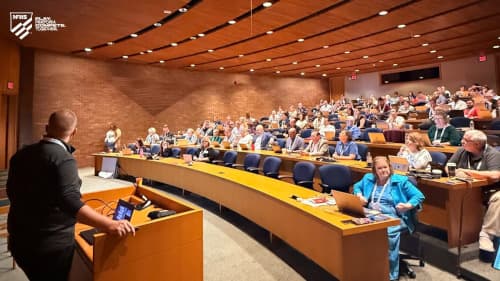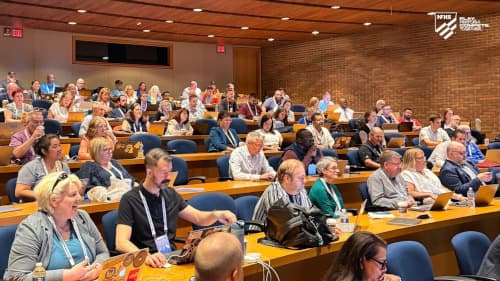2025 NFHS Performing Arts Conference Highlights the Power of Connection, Innovation and Advocacy

More than 120 performing arts administrators, educators and partners from across the country gathered in Chicago for the 2025 NFHS Performing Arts Conference, marking another year of national collaboration and progress for music, speech, debate and theatre education.
The three-day event, hosted by the National Federation of State High School Associations (NFHS), focused on advancing advocacy, innovation and access, key priorities that continue to define the future of arts education in America. Attendees explored new strategies for program growth, technology integration and student engagement, while reaffirming the central role of the arts in developing creativity, communication, and leadership among students nationwide.
A Unifying Force Across Disciplines
This year’s conference underscored the interconnected nature of the performing arts. With sessions addressing everything from alumni engagement and adjudicator training to career pathways and community access, the program reflected the NFHS’s commitment to supporting every facet of arts education.
Panels on advocacy and funding challenges brought together leaders across disciplines, sparking collaborative discussions about sustainability and shared messaging. Educators examined how to communicate the economic and educational value of arts participation, while state leaders shared success stories from rural and urban communities alike.
Dr. Amy Perras, chair of the NFHS Music Advisory Committee, offered this reflection: “I am grateful for the opportunity to help elevate the importance of the arts in education. This year’s conference was both engaging and informative, offering meaningful conversations around advocacy, innovation, and the future of the performing arts. The sessions reminded us that when we come together as educators and leaders, we amplify our impact, not only in music, but across all areas of the arts. These connections strengthen our ability to provide students with transformative experiences that foster creativity, leadership, and community. I look forward to continuing this important work with my colleagues in the year ahead.”

Keynote: A National Call to Elevate the Arts
A defining moment of the conference came with the keynote address from former U.S. Secretary of Education Dr. Miguel Cardona, who delivered an impassioned message on the indispensable role of the performing arts in shaping well-rounded, future-ready students. Drawing on both national policy priorities and personal reflection, Dr. Cardona underscored that arts programs are not extracurricular luxuries but foundational to student achievement, emotional health and civic engagement. His remarks resonated deeply with attendees, reinforcing that advocacy for the arts must be shared across educators, policymakers, and communities alike. The Secretary’s address set the tone for the entire conference, one of unity, optimism, and a renewed commitment to ensuring that every student has access to meaningful artistic experiences in their educational journey.
Innovation, Technology, and the Human Element
Artificial intelligence, emerging technologies, and creative career pathways were major themes throughout the week. Sessions such as Using AI to Improve Efficiency in Administrative Positions, Understanding Copyright and AI in Creative Contexts, and new systems for officials and adjudicators encouraged attendees to see technology not as a replacement for creativity but as a tool for expanding access and improving operations.
Career-focused discussions explored how schools can connect students’ artistic pursuits with future opportunities, including new models for career and technical education (CTE) and industry partnerships.
Chris Paulson, NFHS Director of Performing Arts, is excited to continue working with national arts leaders to balance tradition and innovation in performing arts education and activities. “One thing is clear from our work this week: performing arts education is vitally important to the development of students across the country and to communities in general. We must find ways to balance traditional and proven models for arts education with new and creative experiences, guaranteeing access to these opportunities for all students. As we focus on innovation and meaningful access, we are proud to continue to host the Performing Arts Conference and to support state leaders and arts educators in their collaborative efforts.”
Leadership and Legacy
The 2025 conference also served as a moment of reflection and transition for NFHS leadership in the performing arts community. Outgoing chairs and new directors were recognized for their service, with special acknowledgment of their contributions to advancing equity, safety, and educational quality across all states.
“There is tremendous excitement and energy around support for the arts,” says outgoing NFHS Speech Advisory Committee chair Jana Riggins. “Connection and networking between arts administrators continues to grow thanks to the leadership of the NFHS, and we are proud to continue supporting these essential programs for students across our nation. We look with positivity toward the future, as exposure to the arts, including speech, debate, theatre and music, is indeed life changing.”
As NFHS Performing Arts continues to expand its resources, from adjudicator training programs to national advocacy campaigns, this year’s event emphasized the organization’s growing role as both a convener and catalyst for change.
Looking Ahead
The conference closed with a renewed sense of purpose: to champion the performing arts not only as co-curricular activities, but as essential components of a complete education. With new ideas, stronger partnerships, and an ever-expanding network of state leaders, the NFHS is poised to continue shaping the next generation of performing arts education.
“The energy at this year’s conference was incredible,” said Chris Paulson. “Every discussion reinforced that when we work together, across music, speech, debate, and theatre, we build not just better programs, but a stronger, more vibrant community of educators and students.”







